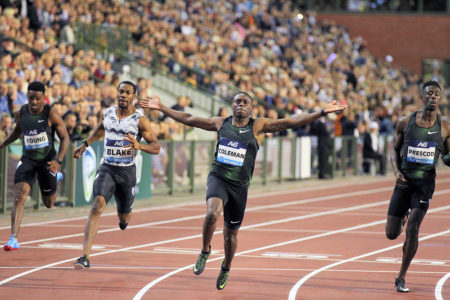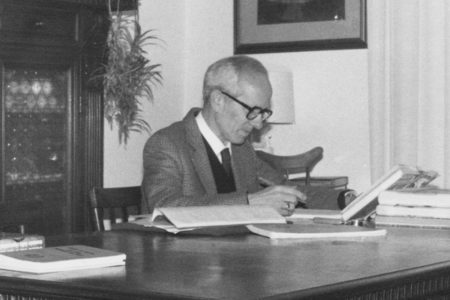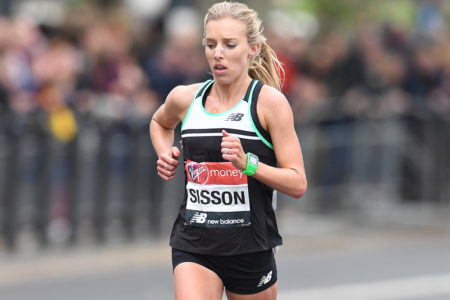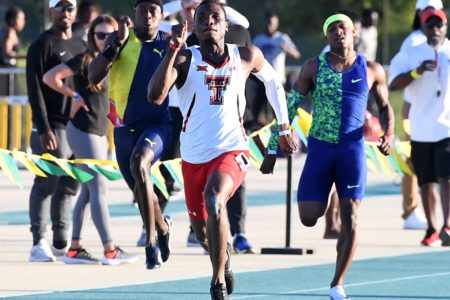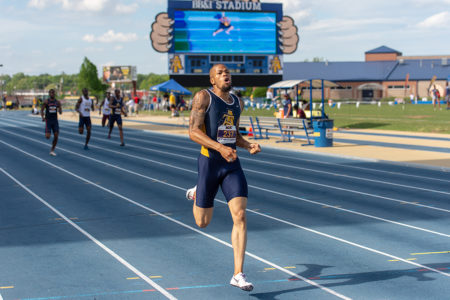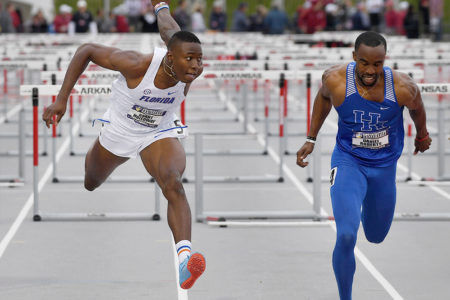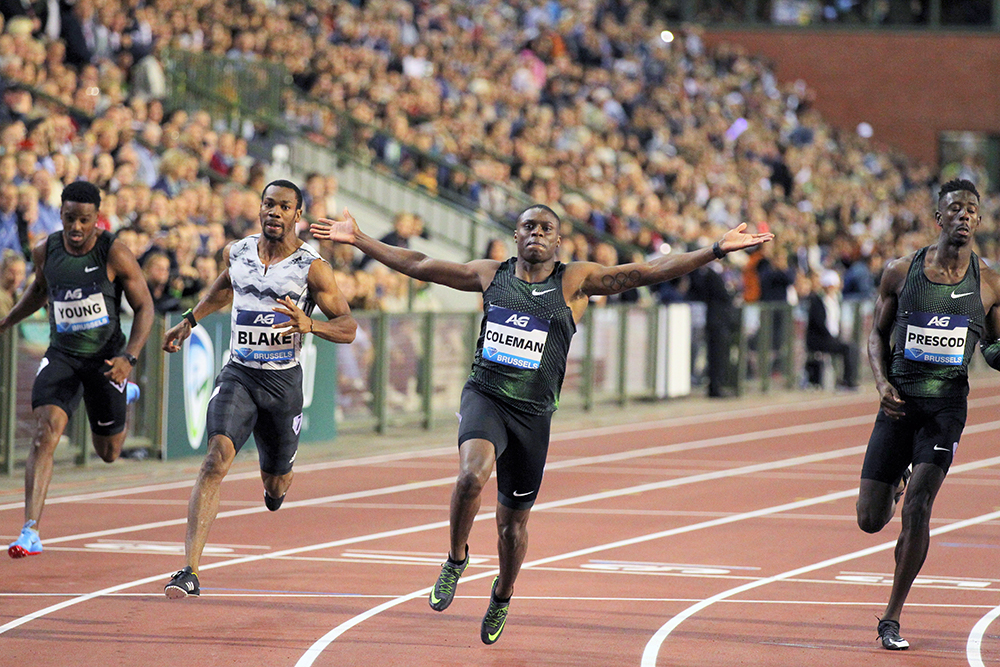
HAVING FINISHED the ’18 season with a bang, his 9.79 PR sewing up the season’s Diamond League 100 title and climbing him a rung on the all-time list to =No. 7, Christian Coleman is once again girded for battle on the DL circuit. Shanghai on Saturday (May 18) will be no gimme rust-buster for the 23-year-old Tennessee alum, who walked the graduation stage in December with his World Indoor 60 gold and pair of ’17 outdoor Worlds silvers draped with pride around his neck.
In the Asian DL venue he is set to meet fellow Americans Ronnie Baker, Noah Lyles and Mike Rodgers, ’18 sub-9 men all, along with China’s recordholder at 9.91, Bingtian Su. The seasonal DL century tilt, Coleman’s second as a pro, is primed to roll out hot from the start—just the way he likes it.
Coleman’s soon-to-end 8½-month competition break included a move, following coach Tim Hall—his guide since his first steps as a Vol in ’14—“about 2 hours up the road” to Lexington, where Hall was hired last summer to coach Kentucky’s sprinters and hurdlers. Different training track, same program, adjusted, of course, for a new point on the Georgia native’s developmental curve. This year Coleman intends to add the 200, in which he won 3 NCAA titles—2 indoors, 1 out—back into his championships program.
The indoor 60 World Record holder fielded T&FN’s questions on a post-workout afternoon in his final preseason training week. After over-the-phone pleasantries, it felt like the right time to ask how he handled three-quarters of a year away from competition. Must have felt strange, right?
T&FN: What’s it been like just training for months past your usual startup date?
Coleman: It’s been a journey but it’s something that everybody’s had to deal with, adjusting your season to try to plan to make that World Championships team. It’s been an adjustment but it’s just part of the grind and I think that’s the part that you have to embrace. That’s the fun part to me, just grinding and figuring it out. Now that it’s time to actually compete, that part’s over. I’m just excited looking forward. You know, we’ll see if all that planning paid off. I’m excited about it.
T&FN: How do you gauge your fitness. Do you know you are ready for Shanghai?
Coleman: Well, my coach, he’s so technical. He does a lot of base work and a lot of strength work to be round-ready so based on my times in practice and based on how I’m feeling after certain workouts, I think I’m really ready to get out there and compete and see where I’m at. With me it’s difficult cuz I like to feel like I’m super-ready and feel like I want to be at 100%, but my coach is kind of like, “We’ll take our time with the speedwork. We’ll do a little bit now and just build up as we go through the season and get ready for USAs.” But as far as right now, I don’t like to put a time or anything like that out there, but I feel pretty good. I feel as best as I’ve ever felt.”
T&FN: That sounds promising before your season opener. Last year you ran under the 60 WR in your first race. Have you worked on anything particular to perfect your sprint game?
Coleman: Definitely. As a sprinter, as anybody who takes pride in what they’re doing and wants to be the best at it, you never get satisfied with what you’ve done in the past. Track & field is a sport of “What have you done for me lately? What can you do for me now and in the future?” So I’m always just trying to get better and fine-tune things and perfect my craft. And I take a lot of pride in that. I’ve been working on my start a lot, trying to get better at that, and the transition. And one of my weaker points is finishing out races and being strong. So I’ve been working on my top end speed as well and being able to hold it. I’ve been working on everything, man. I just want to be a full, complete all-around sprinter, you know? A 60, 100, 200 guy so that’s what I’ve been working on and I’m excited to see my hard work pay off. I think it will be a good season.
T&FN: With so many pros skipping indoor to calibrate the timing of this season for a fall peak, fans are on the edge of their seats as outdoor gets rolling. You raced on 4 x 200 and 4 x 400 squads at the Florida Relays?
Coleman: Mmm-hmm, 4×2 and a 4×4. It was right in the middle of a training cycle, just get out there and get the feet wet a little bit and compete with a couple other good pros, and just see where you are. You cannot really replicate actually running in a meet in practice so I think that was good to have a meet thrown in the middle of training.
T&FN: Any splits from those relays?
Coleman: The 4×2, I’m not really sure. It’s hard to get cuz I ran second leg. It’s easy to get the fourth leg since they start it right at the 200 mark. So I’m not sure but the 4×2 actually felt harder than the 4×4. We hadn’t done a whole bunch of speedwork to that point. So you get the stick and it’s just like full-out sprinting for 200 meters. That kind of felt hard for me, I hadn’t done that in a while. In the 4×4, we’ve been doing a lot of base training so I could kind of sprint and then relax in and then kick at the end. Of course it’s gonna hurt but it felt better than the 4×2. They got me around 44.8, 44.9, which is pretty decent for me, being a sprinter, and especially at that point in my training.

T&FN: You ran second leg on that 4×4. It’s a very different race from the 4×1, but in the short relay you’ve run really well on second leg and on anchor. Do you have a preference?
Coleman: Nah, I don’t really have a preferred leg. Throughout my career I’ve pretty much done them all. They’re kind of all similar in their own right in that you get the stick and go as fast as you can. I guess the different aspect is that second leg is the guy that’s supposed to get you the lead and the fourth leg is the guy who’s supposed to bring it home and get all the good pictures and celebrate and everything. So a lot of people like to be fourth leg, but for me, I don’t know, I’m a team player, I just want to do whatever the coach says is the best. So I don’t really have a preference. I think I definitely have one of the better starts in the world so I think first leg would be good for me or fourth. It don’t really matter to me as long as we get the stick around in a good time and come out with the win.
T&FN: How are you liking Lexington?
Coleman: I moved up there with my coach and I’ve been training. It’s decent, it’s all right. It has a lot of similarities to Knoxville but it’s definitely not the same cuz Knoxville’s where I went to school so it was a lot more comfortable and I know more people and more people know me and recognize me. So I could just go anywhere I wanted in the athletic department. It’s a different aspect but I’m a simple guy. All I need is a place to stay, a place to come in and get the work in with my coach, good nutrition, and that’s about all I need so it serves it’s purpose, it gets the job done. Training’s been going really good, though. I’m feeling great, just in a new city.
T&FN: Do you train at a different time of day than at Tennessee?
Coleman: Not really. Being in college really prepares you for being a pro because your schedule is so hectic, going to class and coming over for practice and going to team meetings. Then coming back and having to go to study hall, you’re just always on the go being in college and still trying to perform as a world-class athlete. But now that I’m done with school I just go to practice and go home and kind of chill so it’s actually a lot less hectic of a schedule. I practice kind of around the same time. Sometimes I’m out there with the college guys on the team, our practices overlap. I don’t necessarily practice with them but we’re kind of all out there at the same time sometimes.
T&FN: College competition seasoned you quickly, for sure. You ran good times as a frosh, made the NCAA Indoor 60 final and the semis in both dashes outdoors. Boom! As a soph you went sub-10 and ran on the relay in the Olympic heats. You probably learned some valuable lessons along the way.
Coleman: I always tell people going to Tennessee was one of the best decisions I’ve ever made. I played football in high school and also ran track so I wasn’t really sure what I was going to do with my future going into my senior year. I didn’t really get the offers I wanted from football but I did with track from a lot of high-profile programs and so decided to go run track at Tennessee, and it turned out to be the best decision I’ve ever made. My freshman year, me being a competitor, it was decent. I was the fastest freshman but I went to the NCAAs and got [5th in the semis] in the 100 and 200. That just kind of left a sour taste in my mouth and helped me to up my game to a whole ’nother level and tune in and fix a lot of things. It really pointed out a lot of my flaws. So just coming back the next year and working on that and just getting better, and maturing naturally as well, getting bigger and stronger. Then I made that Olympic team. When I made the Olympic team that was kind of a breaking point for me: “Man, I’ve worked hard and I see I want to be at this level. I feel like I can compete at this level. I made it and I feel like I still have a lot of things to work on. I feel like, not only am I capable of being at this level, I feel like I can definitely compete with these guys and dominate at this level as well.” I just used that as a confidence boost going into that next season my junior year.
My junior year, it was a special season, everything just kind of worked out in my favor. The indoor season [=CR to win the NCAA 60 and a 20.11 PR to win the 200], and I did my thing with 4 national titles. It just rolled into the World Championships and my profile kind of just took off from there. It happened really fast but there were definitely a lot of lessons within those three years running for Tennessee that really prepared me for my professional career. I wouldn’t change anything for the world.
T&FN: I think I could guess what your highlight moment from the ’17 World Championships was, but what stands out in your memory from running in the Olympics, the biggest meet there is?
Coleman: I have so many memories from just that whole time. My time from there to the World Championships was literally just a complete 180. I wasn’t expected to make that team. I made it but all the professionals on the team, I didn’t know them and I looked up to guys like Justin Gatlin and Tyson Gay, and now I’m at relay practice with them. Running on that prelim squad and going out there and being in that big of a stadium and not really knowing what to expect but then going out there and actually competing. Being on that stage at such a young age, I’d just turned 20 years old, I don’t know, it was just a huge learning experience. I just made so many memories that will last a lifetime that I can’t really pinpoint what my favorite is. I was just there like a deer in the headlights soaking up as much knowledge as I can, just everything and using that experience to prepare me for the next season. Now I’m in a totally different place. We’re definitely going to the World Championships the next year. I went from nobody knows who I am to now people were expecting me to actually compete at this world level. Then the next year I’m literally like a favorite. So it’s just a complete 180.
T&FN: Just hanging out in the Olympic Village must create some memories. Not many get to do that.
Coleman: Some of the other younger guys on the team were who I mostly hung out with. Trayvon Bromell and Jarrion Lawson, we had just a whole bunch of funny times, going to the cafeteria and walking around the Olympic Village and just hanging out. [Before the Games] we went to Prairie View and had the little relay camp. I don’t know, just being around those guys and putting it in the perspective of literally I graduated high school two years ago and now I’m competing with the best guys in the world and handing the stick off to Tyson Gay. You can’t write a better script than that, it’s a crazy feeling. I was just taking things in and cherishing the moment because sometimes you don’t get a chance to really sit and realize what you’ve done in your career, the place that you’re in. But me, not being a favorite and barely making the team and only running in the prelims, I definitely got the opportunity to sit back and realize the stage that I was in. A lot of memories of Trayvon and Jarrion, and Devon Allen was my roommate, so a lot of memories of him. Arianna Washington, she was on that team as well so we became friends and went and did stuff a couple times. The McDonald’s in the Olympic Village, I definitely had a lot of McChickens out there.
T&FN: Famously, Bolt’s go-to food at the ’08 Olympics was chicken nuggets. Did you have any of those?
Coleman: I don’t know, I’m not really a fan of the McDonald’s chicken nuggets but the food out there in the Village was not that great, I’m not gonna lie. So everybody would be at the McDonald’s, the line was super-long. Everybody was eating McDonald’s every day so my big thing was that I’d just get a little McChicken and try to at least not get the McDouble. Some fries and a little smoothie.
T&FN: Trying to eat as healthy as you could at McDonald’s?
Coleman: Yeah [laughs]. Free McDonald’s.
T&FN: How do you eat now as a pro?
Coleman: Man, I definitely have had to learn a lot of things over the years since then. Because once you get to this level it’s about maintaining and fine tuning things. It’s not just going out to practice and working hard. I had to learn about nutrition and hydration and getting the proper rest; doing the things off the track just to stay healthy. I obviously had to get better in all aspects of that. I cook a few more things now. Sometimes I’ll do a little meal prep throughout the week. I’ll cook some chicken and I like a little sweet potatoes. I’ll make some pasta or something like that. I try not to eat out as much or when I do eat out I’ll go to like Whole Foods and get some food there. I’ll drink my smoothies in the morning with the fruit so I definitely have gotten a lot better, especially since then. I try to take care of my body more, just drink water. (Continued below)
T&FN: You’ve said Coach Hall gets a kick out of watching you work through the painful parts of training. Which types of workouts do you like? Are there any that you dread?
Coleman: He thinks that he’s got one when he sees somebody throwing up. That’s a win for him [laughs]. I don’t know, favorite workout? I like the sprint days. I’m not going to go into specifics of what we do in the workouts, but I like block days. It’s so technical, we’re working on little things, watching the film and trying to perfect my start. I like when we have block days like that. The worst is pretty much all fall-training type of stuff: 300s—man, 250s—and we have some workouts where we run a 300 and then have some 50s in between so you’re tired. You still get up and run and then a little break and another 300. Stadiums, hills, none of that is fun but I guess dreaded workouts would definitely be running repeat 300s.
T&FN: What sets you apart and makes you a great sprinter?
Coleman: I think my difference is just my mindset. To me it just comes natural but I feel like being in this place for the time period that I have been so far, I see that my mentality is just totally different from a lot of guys. Growing up, and especially being from Atlanta, it’s just so competitive. It’s dog eat dog so I’m coming in every single day just trying to outwork the next person. I’m not just going against my training partners, I’m training to beat the guys on the other side of the world that are training, the guys that are my competitors that are trying to make the USA team, take my spot. Just that mentality of trying to always stay hungry and always just trying to dominate. And not being afraid to say that, “Yeah, I’m trying to dominate and I don’t care who you are, I don’t care what time it is, what the weather is.” When we step on the line I feel like if I’m on my A-game, I came here to win, I came here to dominate. I feel like just having that mindset has definitely prepared me to try to go out there and just win anything possible and always get better. Even if it’s like an inch more of improvement that I can get, I’m going to try and go and get it. Just never being satisfied, never settling for anything less than what I feel like my full potential is. A lot of guys work hard, a lot of guys go in, they can lift a lot of weight and put the work in. I just feel like me recognizing that I have this talent, this mindset that I just want to dominate at anything at any point in time, whether it’s practice, lifting weights, being on the line, working out, I just want to go get it. I think that’s the difference in me.
T&FN: You’re a professional and a World Record holder. If you were a pro football player, you’d tell people what you do for a living and they’d grasp it. Do you find it hard to explain your job to people who don’t follow track & field?
Coleman: Yeah. Especially in America. When I tell people that I’m a professional track athlete their first reaction is, “OK, that’s really cool. So you’re training for the Olympics?” And I’m like, “Yeah, essentially I’m training for the Olympics.” But then they ask, “What does that entail? What do you do when there’s not an Olympics?” I’m like, “Well, we have a full professional season. We have the Diamond League and other professional meets and we have a World Championships every other year.” Sometimes it’s annoying to explain because if you were in the NFL or NBA it would be, “Oh, yeah, professional football player” or whatever. But I think that’s just part of growing the sport and promoting it. You’ve got to take time to explain to people what’s entailed with being a professional track & field athlete.
T&FN: There certainly is the circuit you mention. In just three seasons you’ve competed in Rio, London, Birmingham, Rome, Rabat and Brussels. Do you enjoy the travel?
Coleman: Yeah, definitely. I think that’s the best part about being a track athlete, that it’s one of those sports that everyone can relate to and everybody can enjoy all across the world. So you get the opportunity to really go and see different cultures, meet different people and see how different people live. And just be in different areas around the world. Some people just never get the chance to experience it. That and getting to go and compete against people across the world.
T&FN: After two losses at the Eugene and Rome Diamond League meets, you took 6 weeks off from racing and bounced back strong with a win at the Rabat DL and then a PR to win the DL title in Brussels. That must have lifted your spirits.
Coleman: I feel like that was definitely one of the more proud moments in my career. I was just like, “Man, the things that nobody saw behind the scenes and me just being devastated.” I had never been hurt before so I felt like, “I don’t even know if this is the end of my career. Am I ever going to get back to where I was?” All these thoughts going through your head if you’ve never had to face an injury like that before, and then seeing guys that you know that you can beat going out and competing and winning races. It’s kind of just disappointing and devastating. I don’t know, you never want to take your health for granted. It definitely made me realize that. So when I finally made it to the Diamond League Final and came out with the win, and saw the clock and I had PRed, it was just kind of like, “Wow!” A reassuring moment.
T&FN: How did your pride in that moment stack up against having beaten Bolt to take World Championships silver the year before?
Coleman: I don’t know. That World Championships was a different experience for me. Right afterwards when I crossed the line of course it was disappointing that you’ve put in all this work. Even right after Rio I had put it in my head that I want to be in that World Championships final, I know it’s going to be Bolt’s last race, it’s going to be super-hyped, it’s going to be everybody in the world watching. I had thought of that a year ago. And then when you actually get there, you get 2nd and it’s that close of a margin [0.02], it’s just like, “Man! Could I have leaned a little later or done something a little different?” I don’t know, just all these thoughts going through your head: “I could have won, it was that close.” All the disappointment and then afterwards you go back and you talk to your coach and everybody and, man. You went through a whole collegiate season, had like 50 races [51, in fact, including relays] and still were able to come out here against the world’s best and get a medal. When you put it in that kind of perspective, that’s a huge accomplishment. And when you take down and beat a guy of Bolt’s stature, like the greatest track & field athlete ever, somebody that you looked up to, somebody that’s literally a superstar, the World Record holder in both your events, that’s just a huge accomplishment. So just use coming in 2nd as motivation to get back to this point and do even better next time. I’m 21 years old [at the time] and had a long collegiate season. We started running in literally December, made it all the way to August and got a medal.
T&FN: Your 4.12 40 on turf with something like “football timing” in ’17 went viral on the internet. It put your name out there to a lot of people who don’t know much about track. Do you spend much time on the internet following what’s up with the other major figures in the sport?
Coleman: Oh, yeah. In today’s time with social media, it’s hard not to see what else is happening in the world, anything in the world. So, yeah, I’m always on Instagram and Twitter and I see results, what other people are doing.
T&FN: What else do you like to do in your spare time besides meal prep and just chilling out?
Coleman: I don’t know, I’m kind of a real chill guy. I like to go to the movies. I play cards sometimes. Whenever I get a chance, I go back home and hang out with my family, my friends. I’m just a real simple guy, I like music. But for the most part what takes up the majority of my time is track. Just track and coming back home and chillin’, watching Netflix and doing what I gotta do to take care of my body. But in the off-season when I get the opportunity to go home or hang out with my friends, I definitely cherish that time.
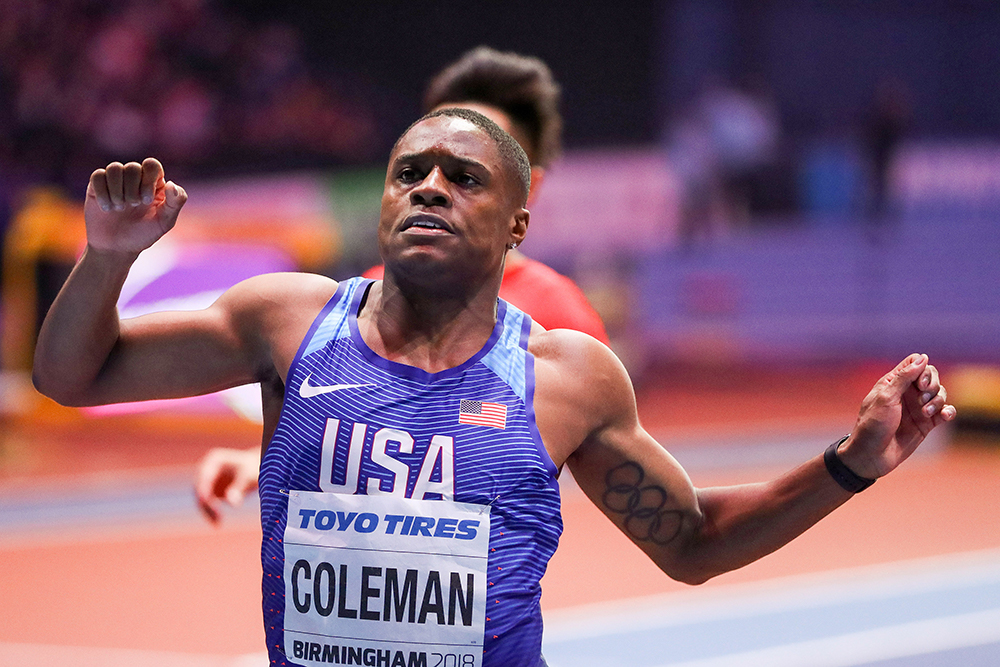
T&FN: Have you seen any good movies lately?
Coleman: Man, I just saw Avengers: Endgame. Super long movie but it was dope, though.
T&FN: Music, who do you like?
Coleman: [laughs] You might not know some of the artists that I like.
T&FN: Are you kidding? I’m in my 50s, you’re 23. Of course, I know them all. Kidding.
Coleman: Let’s see. Being from Atlanta, I listen to a lot of Atlanta rappers; they’re the hardest. Have you heard of this guy named Lil Baby?
T&FN: Heard of him. Couldn’t name one of his songs.
Coleman: [laughs] So I listen to Lil Baby and Gunna. Drake’s probably my favorite artist. I listen to a lot of stuff, I just like listening to music, I listen to R&B too. Just depends on whatever my vibe is.
T&FN: Do you listen to music before races?
Coleman: Definitely. I put on headphones and kind of just lock in, get in my zone. That’s definitely a big part of my prerace ritual. That’s pretty much all it is, putting on my headphones and just zoning out, listening to whatever I’m interested in at the time.
T&FN: Apparently that works. Do you get nervous before races?
Coleman: Nah. I don’t really get nervous anymore. I get anxious, I get butterflies in my stomach, just [that feeling I’m] ready to go out there and compete. You put in the work all season, all year, which is the hard part. And then the fun part is going out there and competing and seeing where you’re at and trying to run fast times. You just want to be out there and get to it, just kind of anxious.
T&FN: You’d like to win medals in Doha this fall. Then you’ve got to turn around and be as ready as possible for the Olympic year. Is there a balancing act between those two goals?
Coleman: You kind of just have to separate the two. Of course, the Olympics is the pinnacle of the sport—what everybody pays attention to even if they’re not track fans. All of a sudden the Olympics come around and they take a lot of pride in their country and they’re watching and cheering for their country. It really doesn’t get any bigger than that, winning an Olympic gold medal. So obviously that’s a huge goal of mine but you kind of just have to put [the two championships] in two separate files, just put that in the back of your head for later until after this season and totally focus in on the task at hand, which is a big one. Winning World Championships medals, that’s huge in our sport. So I’m just excited about getting the opportunity to go out and compete this year and just going out and trying to win some medals at the World Championships. Then as soon as the World Championships is over I can pull that file from the back of my head and now we just start totally focusing and planning on trying to make that run at making that Olympic team. But right now I’m just totally focused and locked in on Doha.
